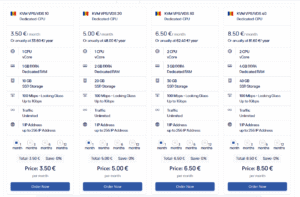“Ethereum has long been the undisputed king of DeFi, but in 2025, a new generation of blockchains is rising to challenge its dominance. As decentralized finance (DeFi) continues to evolve, alternative blockchains are not just catching up – they’re reshaping the landscape.”
In this new frontier of decentralized finance, DeFi development companies are at the forefront, crafting innovative protocols that leverage the capabilities of blockchains beyond Ethereum. From scalability to lower fees and novel consensus mechanisms, these alternative blockchains are laying the groundwork for a new era in decentralized finance (DeFi).
The Growing Demand for Alternative Blockchains
Ethereum’s status as the go-to platform for DeFi is no accident. It pioneered the smart contract revolution and cultivated a vibrant developer community. However, its limitations—high gas fees, network congestion, and scalability bottlenecks—have driven many to look elsewhere.
In 2025, alternative blockchains have emerged as formidable contenders. They’re not only addressing the technical limitations of Ethereum but also offering new features that align with the evolving needs of DeFi users.
Leading Alternative Blockchains Powering DeFi
Let’s explore some of the most promising blockchains that are redefining the DeFi landscape in 2025:
Binance Smart Chain (BSC)
Binance Smart Chain remains a favorite due to its low transaction fees and high throughput. Its compatibility with Ethereum’s EVM (Ethereum Virtual Machine) means developers can easily port their dApps to BSC, attracting a wave of DeFi projects.
The BNB Chain ecosystem has become a DeFi hotspot, offering lending platforms, decentralized exchanges (DEXs), yield farming, and more. Lower fees and faster block times have been instrumental in onboarding millions of users.
Solana
Solana’s lightning-fast transaction speeds and ultra-low fees have propelled it into the DeFi spotlight. In 2025, Solana’s DeFi ecosystem has matured, featuring robust DEXs, lending protocols, and synthetic asset platforms.
For DeFi developers, Solana’s unique Proof-of-History consensus mechanism and parallel transaction processing enable innovative applications that simply aren’t feasible on Ethereum.
3Avalanche
Avalanche has earned its reputation as a “high-speed chain for DeFi.” Its unique consensus protocol enables near-instant transaction finality, making it ideal for applications that require high throughput and low latency.
DeFi platforms on Avalanche, such as Pangolin and Trader Joe, have become household names, offering users efficient, low-cost trading and yield farming opportunities.
Polkadot
Polkadot’s interoperable framework enables DeFi applications to interact seamlessly across multiple blockchains. In 2025, Polkadot’s parachain ecosystem is a hotbed for cross-chain DeFi projects, enabling liquidity to flow freely between previously siloed networks.
For developers, this translates to more possibilities and more robust DeFi ecosystems that transcend the boundaries of a single blockchain.
5Cosmos
Cosmos has championed the concept of “Internet of Blockchains,” and its interoperable hub-and-spoke model has made it a natural home for cross-chain DeFi.
In 2025, Cosmos-based DeFi platforms leverage its IBC (Inter-Blockchain Communication) protocol to offer services that extend beyond a single blockchain, paving the way for multi-chain liquidity and asset transfers.
Key Advantages of DeFi on Alternative Blockchains
The rise of alternative blockchains is not just about escaping Ethereum’s high fees—it’s about building a more inclusive and scalable financial future.
Here’s what sets them apart:
Scalability: Alternative blockchains, such as Solana and Avalanche, offer high throughput and fast confirmation times, catering to the demands of DeFi users.
Lower Transaction Costs: Low fees enable DeFi applications to be more accessible, particularly for smaller investors.
Interoperability: Platforms like Polkadot and Cosmos focus on seamless interaction between chains, fostering a more connected DeFi ecosystem.
Innovative Consensus Models: Alternative blockchains experiment with novel consensus mechanisms—like Avalanche’s Avalanche Consensus and Solana’s Proof-of-History—pushing the boundaries of what’s possible.
Enhanced User Experience: Faster, cheaper, and more reliable transactions enhance DeFi’s usability and mass adoption.
Challenges and Considerations
While alternative blockchains are opening new doors, they come with their own sets of challenges.
Security Risks: New blockchains may not have the same security track record as Ethereum. Users and developers must be vigilant in understanding the risks associated with these technologies.
Fragmentation: The multi-chain world can lead to liquidity fragmentation, making it harder to unify DeFi’s liquidity pools.
Regulatory Uncertainty: As DeFi expands across multiple chains, regulatory frameworks are still evolving, potentially complicating cross-chain operations.
Despite these challenges, the momentum behind alternative blockchains is undeniable.
How DeFi Development Companies Are Driving the Shift
The backbone of this multi-chain DeFi revolution is the expertise and innovation of DeFi development companies. These firms are building the bridges, tools, and platforms that enable seamless experiences across blockchains.
Their role includes:
- Cross-chain Protocol Development: Crafting DeFi solutions that leverage interoperability protocols like Polkadot’s parachains or Cosmos’ IBC.
- Custom Smart Contract Development: Designing smart contracts optimized for each chain’s unique features and consensus mechanisms.
- Wallet and UI/UX Innovation: Creating interfaces that make it easy for users to interact with DeFi across multiple networks.
- Security Auditing: Ensuring that DeFi applications on alternative blockchains adhere to the highest standards of security.
In 2025, the competition among DeFi development companies is fierce, and the winners are those who understand not just Ethereum, but the nuances of these alternative ecosystems.
Why Users Are Exploring Beyond Ethereum
For DeFi users in 2025, exploring alternative blockchains isn’t just a novelty—it’s a necessity.
Lower Fees and Faster Transactions: Users tired of Ethereum’s gas fees are finding refuge in blockchains that offer affordability and speed.
New DeFi Opportunities: Emerging blockchains foster innovative DeFi protocols, from algorithmic stablecoins on Terra to yield optimizers on Solana.
Enhanced Financial Inclusion: Lower transaction costs and faster settlements broaden DeFi’s accessibility to users in regions where Ethereum’s fees would be prohibitive.
The Role of Blockchain Development Companies
As DeFi diversifies, blockchain development companies play a pivotal role in ensuring these platforms are robust, secure, and user-friendly. They’re the architects of the next phase of DeFi innovation.
Whether it’s integrating layer-2 scaling solutions or deploying cross-chain bridges, blockchain development companies are the glue that holds this fragmented ecosystem together. Their efforts are driving adoption and empowering the growth of DeFi across multiple blockchains.
In 2025, their work is critical not just for the success of individual DeFi projects, but for the health and security of the entire ecosystem.
Navigating the DeFi Wallet Landscape
With DeFi expanding across multiple chains, the need for wallets that can handle these ecosystems is more crucial than ever. This is where DeFi wallet development services come into play.
In 2025, DeFi wallets are no longer just about storing assets—they’re about enabling seamless, cross-chain experiences. Here’s how:
Multi-Chain Support: DeFi wallets integrate with networks such as Solana, Avalanche, and Polkadot, providing users with a single interface to interact with multiple DeFi protocols.
Security-First Design: As new blockchains emerge, DeFi wallet developers prioritize incorporating the latest security practices to safeguard user assets.
User-Friendly Interfaces: Enhanced UI/UX makes managing DeFi assets across blockchains intuitive and stress-free.
DeFi Integration: Advanced wallets now include built-in DEXs, yield farming dashboards, and staking tools to streamline DeFi activities.
For both users and developers, DeFi wallet development services are the key to unlocking the full potential of the multi-chain DeFi world.
The Road Ahead: DeFi’s Multi-Chain Future
As we look beyond Ethereum in 2025, it’s clear that DeFi’s future lies in a multi-chain ecosystem. Alternative blockchains are not merely backup options—they’re central to the next phase of DeFi’s evolution.
We’re seeing a shift from Ethereum-centric DeFi to a world where liquidity and innovation span across ecosystems. With the backing of skilled developers, blockchain engineers, and visionary projects, this future looks promising.
For users, this means more opportunities to access DeFi products tailored to their needs—whether it’s on Solana, Avalanche, Cosmos, or beyond. For developers and businesses, it means endless potential to build the next wave of financial tools that empower individuals worldwide.
Conclusion
In 2025, DeFi’s playground has expanded far beyond Ethereum’s borders. Alternative blockchains are no longer just contenders—they’re shaping the future of finance. As the ecosystem diversifies, the work of DeFi development companies and blockchain development companies becomes increasingly vital, driving innovation and ensuring secure, scalable, and user-friendly DeFi experiences.
If you’re ready to explore these alternative blockchains and craft DeFi solutions that harness their power, consider partnering with a trusted development partner. At Suffescom Solutions Inc., we specialize in building cutting-edge DeFi applications that thrive across blockchains. Let’s collaborate to shape the future of decentralized finance together!
- Beyond Ethereum: DeFi on Alternative Blockchains in 2025
- Explore how DeFi is thriving beyond Ethereum in 2025. Discover the leading alternative blockchains and how they’re reshaping decentralized finance.
- DeFi, Alternative Blockchains, 2025 Trends, Blockchain Development Company, DeFi Wallet Development, DeFi Development Company, Web3, Ethereum Alternatives, Blockchain Solutions Let me know if you’d like me to adjust these for specific SEO goals or target audience refinements! 🚀
Related posts:
 Rexas Finance Launch Nears as Whales Turn to a $20M Token Opportunity
Rexas Finance Launch Nears as Whales Turn to a $20M Token Opportunity
 EVM Compatible Blockchain 2025: The Backbone of Web3 Scalability & Innovation
EVM Compatible Blockchain 2025: The Backbone of Web3 Scalability & Innovation
 Get Started with RăbbitX: A Next-Gen StarkNet* DEX | RabbitX.Com
Get Started with RăbbitX: A Next-Gen StarkNet* DEX | RabbitX.Com
 Planning Real Estate Moves in 2025: The SmartKey Realty Perspective
Planning Real Estate Moves in 2025: The SmartKey Realty Perspective
 Shattering the Norm: The Way 2025’s Crypto Presales Are Revolutionizing Web3 Startups
Shattering the Norm: The Way 2025’s Crypto Presales Are Revolutionizing Web3 Startups
 2025’s Best Crypto Presale Tokens: Stealthy Builders, Bold Futures
2025’s Best Crypto Presale Tokens: Stealthy Builders, Bold Futures
 ICP Price Forecast: Unveiling Internet Computer’s 2025 Web3 Potential
ICP Price Forecast: Unveiling Internet Computer’s 2025 Web3 Potential
 Godspeed Hoodie & Tracksuit A Language for the Unspoken Godspeed Hoodie & Tracksuit A Language for the Unspoken
Godspeed Hoodie & Tracksuit A Language for the Unspoken Godspeed Hoodie & Tracksuit A Language for the Unspoken








